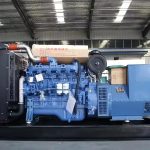Introduction
Diesel generators play a crucial role in providing backup power during times of electrical outages or when a reliable power source is needed in remote locations. To ensure the optimal performance and reliability of a diesel generator, it is essential to conduct a thorough commissioning inspection before putting it into service. This article will delve into the importance of commissioning inspection for diesel generators, the key steps involved in the process, and best practices to follow to ensure a successful inspection.
Importance of Commissioning Inspection
Commissioning inspection is a critical step in the lifecycle of a diesel generator as it helps identify potential issues and ensures that the generator is functioning correctly before it is put into operation. By conducting a comprehensive inspection, any defects or deficiencies can be addressed early on, preventing costly repairs or downtime in the future.

A properly commissioned diesel generator will not only operate efficiently but also have an extended lifespan, reducing the risk of unexpected failures and ensuring uninterrupted power supply when needed. Additionally, commissioning inspection helps verify that the generator meets all safety and regulatory requirements, protecting both the equipment and the personnel operating it.
Key Steps in Diesel Generator Commissioning Inspection
1. Visual Inspection: The first step in the commissioning inspection process is to conduct a visual inspection of the diesel generator. This includes checking for any signs of physical damage, leaks, loose connections, or corrosion. Inspect the engine, alternator, fuel system, cooling system, and electrical components for any abnormalities.
2. Functional Testing: Once the visual inspection is complete, the next step is to perform functional testing to ensure that all components of the generator are operating as intended. This includes testing the starting system, fuel supply system, cooling system, and electrical connections. Verify that the generator can start and run under load conditions without any issues.
3. Load Bank Testing: Load bank testing is crucial to verify the performance of the diesel generator under varying load conditions. By subjecting the generator to different load levels, you can confirm its capacity and efficiency. This test helps identify any issues related to voltage regulation, frequency stability, and overall performance under load.
4. 1000kw diesel generator for remote industrial applications : The fuel system is a critical component of a diesel generator, and any issues with the fuel supply can lead to generator failure. During the commissioning inspection, check the fuel tanks, filters, lines, and injectors for leaks, contamination, or blockages. Ensure that the fuel quality meets the manufacturer's specifications.
5. Cooling System Check: Proper cooling is essential for the optimal operation of a diesel generator. Inspect the radiator, coolant level, hoses, and fan for any signs of leaks or blockages. Verify that the cooling system is functioning correctly and that the engine temperature remains within the recommended range during operation.
6. Electrical System Testing: The electrical system of a diesel generator includes components such as the control panel, circuit breakers, transfer switches, and wiring. Conduct a thorough inspection of the electrical connections, wiring integrity, and grounding system. Test the control panel functions and ensure that all safety features are working properly.
7. Emission Compliance Verification: Diesel generators are subject to emissions regulations to minimize environmental impact. Verify that the generator complies with local emissions standards and that the exhaust system is properly installed and functioning. Check for any black smoke or unusual odors during operation, which could indicate emissions issues.
Best Practices for Diesel Generator Commissioning Inspection
1. Follow Manufacturer Guidelines: Always refer to the manufacturer's commissioning guidelines and recommendations when inspecting a diesel generator. These guidelines provide specific instructions on how to properly commission the generator and ensure its optimal performance.
2. Document Inspection Results: Keep detailed records of the commissioning inspection process, including visual inspections, test results, and any issues identified. This documentation will serve as a reference for future maintenance and troubleshooting, helping to track the generator's performance over time.
3. Work with Qualified Technicians: Commissioning inspection of a diesel generator requires specialized knowledge and expertise. Work with qualified technicians or service providers who have experience in diesel generator maintenance and commissioning. They can ensure that the inspection is conducted correctly and in compliance with industry standards.
4. Schedule Regular Maintenance: Regular maintenance is essential to keep a diesel generator in optimal condition. Develop a maintenance schedule based on the manufacturer's recommendations and industry best practices. This includes routine inspections, filter changes, oil analysis, and other preventive maintenance tasks.
5. Conduct Load Testing: In addition to load bank testing during commissioning, regularly conduct load testing on the diesel generator to verify its performance under varying load conditions. This helps identify any issues with the generator's capacity, voltage regulation, and overall reliability.
Conclusion
Commissioning inspection is a critical step in ensuring the reliable operation of a diesel generator. By following the key steps outlined in this article and adhering to best practices, you can identify potential issues early on, prevent unexpected failures, and ensure that the generator meets all safety and regulatory requirements. A properly commissioned diesel generator will provide uninterrupted power supply when needed, protecting critical operations and facilities from downtime. By investing time and resources in a thorough commissioning inspection, you can maximize the lifespan and performance of your diesel generator, ultimately saving costs and ensuring a reliable power supply for your operations.
